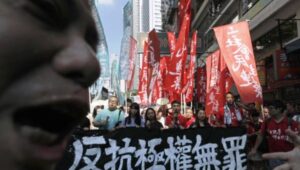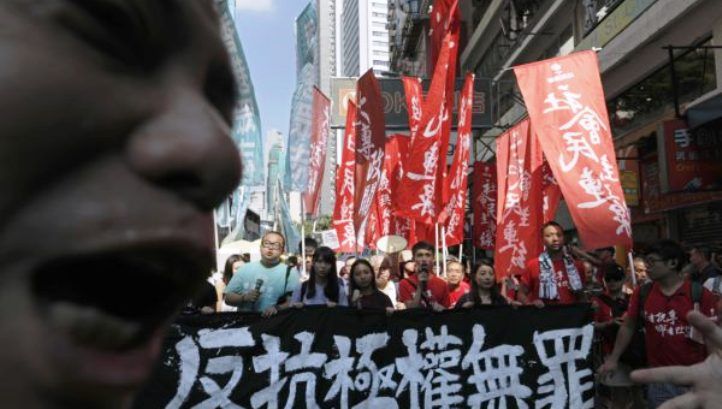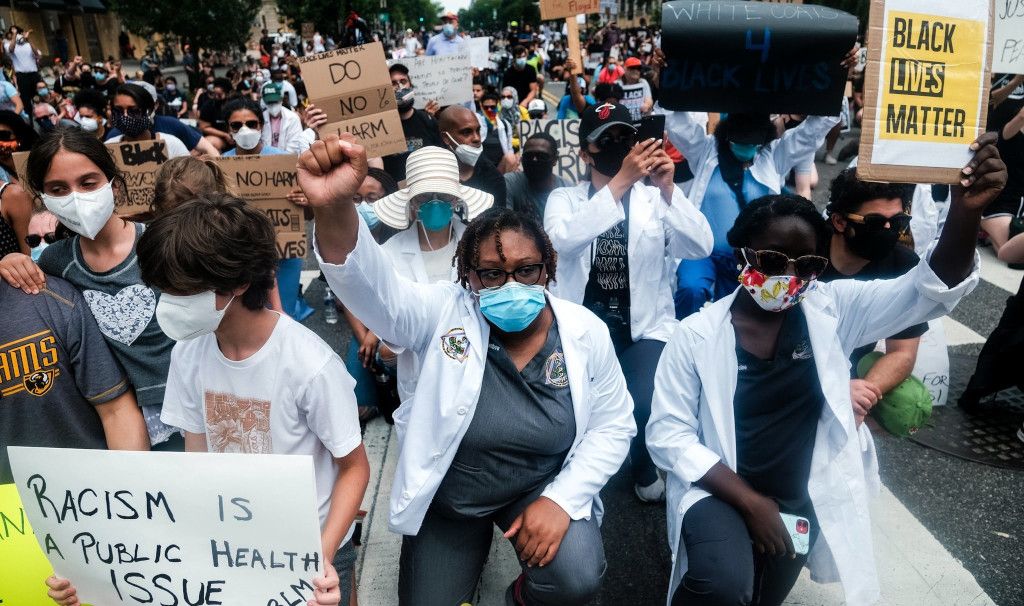Dikang is a member of Socialist Action (CWI in Hong Kong).
 Hong Kong is facing an unprecedented attack on democratic rights orchestrated by its pro-Beijing government. In recent months young activists have been jailed and elected legislators have been ousted from the partially elected local parliament (‘Legco’) on the flimsiest of ‘legal’ pretexts.
Tens of thousands marched against the repression in August, but the pro-government camp is stepping up its vicious attacks on the pro-democracy camp and democratic rights, especially singling out supporters of independence.
Support for independence has become increasingly popular among young people, especially since the 2014 mass Umbrella Movement, as the Chinese dictatorship’s repression intensifies and spills into Hong Kong. A June opinion poll showed 21.9 percent of those aged 25-39 support Hong Kong independence, a slight dip from 23.9 percent in 2016. But clearly, the ferocious campaign by the establishment and mainstream media to demonise independence has only had a very limited effect.
The majority of the pro-democracy parties in Hong Kong oppose independence, while some smaller more radical parties adopt a vague position, listing it as “one of the options”, without putting forward a coherent strategy to realise it.
Nevertheless the independence issue is used incessantly by the pro-government camp to justify greater repression. This is linked to the shrill Chinese nationalism of the Beijing regime.
With the start of the new school term in September, pro-independence banners appeared on the campus of Chinese University of Hong Kong, attracting huge publicity and controversy. Similar banners then appeared at several other campuses. The university authorities, egged on by the Beijing loyalist camp, have taken a hard line against the banners, removing them and vowing to punish those responsible.
Call a one-day student strike
The banner issue has been seized upon by the pro-government camp to justify new intrusive restrictions on campus political activity. Student activists who have led protests against this censorship have been threatened with disciplinary measures and the authorities are trying to curb the role of student unions. The basic rights of students are at stake such as freedom of speech, of political thought, and the right to organise freely, and this applies not only to students.
The university authorities have no legal basis for the measures they are taking. There is as yet no law against advocating or debating independence in Hong Kong. But this is clearly something the more deranged wing of the ruling class wants to change.
Socialist Action (CWI in Hong Kong) stands firmly for the defence of the democratic rights and freedom of speech of students and all other groups. As in Barcelona at the moment, we say debating independence is a democratic right, not a crime. To resist new repressive restrictions students need to organise actively on campus – a one-day strike of university students, taking a leaf out of the Spanish Students Union, who are mobilising to defend Catalonia’s democratic rights, would be the most effective response as a way to launch mass resistance to the political crackdown.
Using pro-independence activists, such as the Hong Kong ‘localists’, as a scarecrow to justify repression is a favoured tactic from the Chinese regime’s arsenal. The disqualification of six elected legislators, overturning September’s election results, also began with the removal of two ‘localists’ representing ‘Youngspiration’, a small right-wing racist group. The government was able to test the ground by targeting the two, who showed themselves to be exceptionally ill-prepared to offer any campaign of resistance.
Seeing there was no major public reaction, and with the main pan-democratic (liberal bourgeois) parties effectively sitting on the fence over these disqualifications, the establishment camp took this as a green light to widen its attack. It moved against the radical wing of the pan-democrats, targeting a further four legislators including Leung Kwok-hung (‘Long Hair’) of the League of Social Democrats (LSD).
Blue ribbon rally
On Sunday, 17 September, a rally was organised by pro-government ‘blue ribbon’ supporters including criminal gangs. These are the forces, sometimes paid, that the Chinese regime and Hong Kong government use to harry and intimidate the democracy movement. This is the outline of what could become a quasi-fascist force, draped in the flag of Chinese nationalism.
At this rally, politician Junius Ho Kwan-yiu and other pro-government figures called for pro-independence activists to be “killed”! Ho said it was “not a big deal to kill pigs or dogs.” The Hong Kong government’s Secretary of Justice later claimed Ho’s public remarks did not amount to an incitement to violence! And this is when peaceful ‘democracy’ protesters are being jailed for allegedly inciting violent behaviour.
Ho is also pursuing a political vendetta against liberal professor Benny Tai Yiu-ting, a prominent figure in the ‘Occupy Central’ campaign of 2013-14. Ho argues that Tai should not be allowed to teach law students at Hong Kong University because of his advocacy for civil disobedience. Ho initiated a petition with an alleged 80,000 signatures demanding Tai’s dismissal.
In a separate development, Benny Tai went on trial on Tuesday 19 September on charges connected with the 2014 Umbrella Movement including “conspiracy to commit public nuisance”. The next day, Tai and another eight Umbrella activists were in court to face even more charges.
Tai and his eight co-defendants may receive jail sentences – a practice which is becoming the ‘new normal’ in Hong Kong’s political trials. The top judiciary has largely been incorporated into the Chinese regime’s system of oppression. The latest cases follow the jailing of sixteen young activists in August for terms of up to 13 months. Many more political show trials – at least another 40 cases – are in the pipeline, with the government intent on decapitating the democracy struggle and especially targeting its most radical components such as the LSD party and the student-led ‘Demosisto’.
China’s problem
The crackdown in Hong Kong has been ordered by the Chinese dictatorship and echoes an even more chilling attack on dissent inside China.
Hong Kong is a bourgeois ‘semi democracy’ where rights such as a relatively free press, partially open elections, the right of assembly and free speech, have been won by mass struggle over several decades. The last parliamentary elections in September 2016 resulted in a strengthening of opposition parties and groups despite the government having an in-built majority in the Legco (Assembly). This became the starting signal for a concerted offensive – a political counter-revolution – by the government. Even the pan-democrat leaders now say that Hong Kong has become “an authoritarian state”.
Beijing evidently feels threatened that the mass democracy struggle in Hong Kong could spread to mainland China and inspire demands for democratic rights there. Despite its outward projection of power and economic strength, the ruling ‘Communist’ party-state and its ‘core leader’, Xi Jinping, face an array of potentially devastating challenges: a debt crunch, galloping social inequality, heightened global tensions and the risk of mass unrest.
The regime fears that Hong Kong’s stubborn tendency to protest in defence of democratic rights, as brilliantly displayed on 20 August this year, when up to 140,000 people crammed the streets over the jailing of the young activists, could become the fuse for an all-China political conflagration.
Socialists condemn the victimisation of pan-democratic politicians and activists such as Benny Tai Yiu-ting. We have initiated numerous protests against the repression in Hong Kong and are coordinating an international campaign of solidarity with the democracy struggle. An international protest day is being prepared on Thursday 12 October, which is the first anniversary of the disqualification of opposition legislators, and further updates on this campaign will be reported on socialistworld.net.
At the same time we point out that the liberal pro-capitalist democrats have unfortunately time after time applied the brakes to mass struggle, partly in fear they will lose control to more ‘radical’forces, and partly in the false belief that their ‘moderation’ can secure democratic concessions and make possible a deal with the Chinese dictatorship. In reality, the opposite is true. Today’s unprecedented crackdown shows that the only ‘deal’ possible with the dictatorship will be on the bones of Hong Kong’s democratic rights.
Only militant mass struggle can defeat the current repressive onslaught. To succeed, the struggle needs a strategy to replace dictatorial rule – in China and Hong Kong – with a fully democratic system. This will only be possible by decisively breaking from the framework of corrupt capitalism and the dictatorial rule of the billionaire 1%.
Hong Kong is facing an unprecedented attack on democratic rights orchestrated by its pro-Beijing government. In recent months young activists have been jailed and elected legislators have been ousted from the partially elected local parliament (‘Legco’) on the flimsiest of ‘legal’ pretexts.
Tens of thousands marched against the repression in August, but the pro-government camp is stepping up its vicious attacks on the pro-democracy camp and democratic rights, especially singling out supporters of independence.
Support for independence has become increasingly popular among young people, especially since the 2014 mass Umbrella Movement, as the Chinese dictatorship’s repression intensifies and spills into Hong Kong. A June opinion poll showed 21.9 percent of those aged 25-39 support Hong Kong independence, a slight dip from 23.9 percent in 2016. But clearly, the ferocious campaign by the establishment and mainstream media to demonise independence has only had a very limited effect.
The majority of the pro-democracy parties in Hong Kong oppose independence, while some smaller more radical parties adopt a vague position, listing it as “one of the options”, without putting forward a coherent strategy to realise it.
Nevertheless the independence issue is used incessantly by the pro-government camp to justify greater repression. This is linked to the shrill Chinese nationalism of the Beijing regime.
With the start of the new school term in September, pro-independence banners appeared on the campus of Chinese University of Hong Kong, attracting huge publicity and controversy. Similar banners then appeared at several other campuses. The university authorities, egged on by the Beijing loyalist camp, have taken a hard line against the banners, removing them and vowing to punish those responsible.
Call a one-day student strike
The banner issue has been seized upon by the pro-government camp to justify new intrusive restrictions on campus political activity. Student activists who have led protests against this censorship have been threatened with disciplinary measures and the authorities are trying to curb the role of student unions. The basic rights of students are at stake such as freedom of speech, of political thought, and the right to organise freely, and this applies not only to students.
The university authorities have no legal basis for the measures they are taking. There is as yet no law against advocating or debating independence in Hong Kong. But this is clearly something the more deranged wing of the ruling class wants to change.
Socialist Action (CWI in Hong Kong) stands firmly for the defence of the democratic rights and freedom of speech of students and all other groups. As in Barcelona at the moment, we say debating independence is a democratic right, not a crime. To resist new repressive restrictions students need to organise actively on campus – a one-day strike of university students, taking a leaf out of the Spanish Students Union, who are mobilising to defend Catalonia’s democratic rights, would be the most effective response as a way to launch mass resistance to the political crackdown.
Using pro-independence activists, such as the Hong Kong ‘localists’, as a scarecrow to justify repression is a favoured tactic from the Chinese regime’s arsenal. The disqualification of six elected legislators, overturning September’s election results, also began with the removal of two ‘localists’ representing ‘Youngspiration’, a small right-wing racist group. The government was able to test the ground by targeting the two, who showed themselves to be exceptionally ill-prepared to offer any campaign of resistance.
Seeing there was no major public reaction, and with the main pan-democratic (liberal bourgeois) parties effectively sitting on the fence over these disqualifications, the establishment camp took this as a green light to widen its attack. It moved against the radical wing of the pan-democrats, targeting a further four legislators including Leung Kwok-hung (‘Long Hair’) of the League of Social Democrats (LSD).
Blue ribbon rally
On Sunday, 17 September, a rally was organised by pro-government ‘blue ribbon’ supporters including criminal gangs. These are the forces, sometimes paid, that the Chinese regime and Hong Kong government use to harry and intimidate the democracy movement. This is the outline of what could become a quasi-fascist force, draped in the flag of Chinese nationalism.
At this rally, politician Junius Ho Kwan-yiu and other pro-government figures called for pro-independence activists to be “killed”! Ho said it was “not a big deal to kill pigs or dogs.” The Hong Kong government’s Secretary of Justice later claimed Ho’s public remarks did not amount to an incitement to violence! And this is when peaceful ‘democracy’ protesters are being jailed for allegedly inciting violent behaviour.
Ho is also pursuing a political vendetta against liberal professor Benny Tai Yiu-ting, a prominent figure in the ‘Occupy Central’ campaign of 2013-14. Ho argues that Tai should not be allowed to teach law students at Hong Kong University because of his advocacy for civil disobedience. Ho initiated a petition with an alleged 80,000 signatures demanding Tai’s dismissal.
In a separate development, Benny Tai went on trial on Tuesday 19 September on charges connected with the 2014 Umbrella Movement including “conspiracy to commit public nuisance”. The next day, Tai and another eight Umbrella activists were in court to face even more charges.
Tai and his eight co-defendants may receive jail sentences – a practice which is becoming the ‘new normal’ in Hong Kong’s political trials. The top judiciary has largely been incorporated into the Chinese regime’s system of oppression. The latest cases follow the jailing of sixteen young activists in August for terms of up to 13 months. Many more political show trials – at least another 40 cases – are in the pipeline, with the government intent on decapitating the democracy struggle and especially targeting its most radical components such as the LSD party and the student-led ‘Demosisto’.
China’s problem
The crackdown in Hong Kong has been ordered by the Chinese dictatorship and echoes an even more chilling attack on dissent inside China.
Hong Kong is a bourgeois ‘semi democracy’ where rights such as a relatively free press, partially open elections, the right of assembly and free speech, have been won by mass struggle over several decades. The last parliamentary elections in September 2016 resulted in a strengthening of opposition parties and groups despite the government having an in-built majority in the Legco (Assembly). This became the starting signal for a concerted offensive – a political counter-revolution – by the government. Even the pan-democrat leaders now say that Hong Kong has become “an authoritarian state”.
Beijing evidently feels threatened that the mass democracy struggle in Hong Kong could spread to mainland China and inspire demands for democratic rights there. Despite its outward projection of power and economic strength, the ruling ‘Communist’ party-state and its ‘core leader’, Xi Jinping, face an array of potentially devastating challenges: a debt crunch, galloping social inequality, heightened global tensions and the risk of mass unrest.
The regime fears that Hong Kong’s stubborn tendency to protest in defence of democratic rights, as brilliantly displayed on 20 August this year, when up to 140,000 people crammed the streets over the jailing of the young activists, could become the fuse for an all-China political conflagration.
Socialists condemn the victimisation of pan-democratic politicians and activists such as Benny Tai Yiu-ting. We have initiated numerous protests against the repression in Hong Kong and are coordinating an international campaign of solidarity with the democracy struggle. An international protest day is being prepared on Thursday 12 October, which is the first anniversary of the disqualification of opposition legislators, and further updates on this campaign will be reported on socialistworld.net.
At the same time we point out that the liberal pro-capitalist democrats have unfortunately time after time applied the brakes to mass struggle, partly in fear they will lose control to more ‘radical’forces, and partly in the false belief that their ‘moderation’ can secure democratic concessions and make possible a deal with the Chinese dictatorship. In reality, the opposite is true. Today’s unprecedented crackdown shows that the only ‘deal’ possible with the dictatorship will be on the bones of Hong Kong’s democratic rights.
Only militant mass struggle can defeat the current repressive onslaught. To succeed, the struggle needs a strategy to replace dictatorial rule – in China and Hong Kong – with a fully democratic system. This will only be possible by decisively breaking from the framework of corrupt capitalism and the dictatorial rule of the billionaire 1%. 



